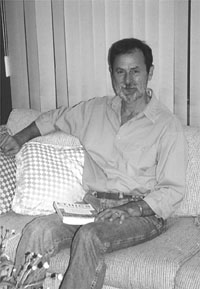
From 1965 to 1967, Arthur Dobrin and his wife worked as Peace Corps volunteers in Kisii, Kenya. In 1990 and 1998, he authored two novels, Malaika and Salted with Fire, respectively, which revolve around a character Dobrin created from his experiences in East Africa as a member of the Peace Corps.
Seeing Through Africa with Arthur Dobrin
Westbury Author Publishes 20th Book
By Marina McGowan
In many ways, Arthur Dobrin has never left Kenya. In fact, he even considers it his second home, next in line to Westbury. While staying deeply connected to Africa through letters, visits and the Internet, Dobrin has made time to recently publish his 20th book, Seeing Through Africa.
The 254-four page book is a memoir built around themes that take Dobrin, 60, and his family from New York to East Africa and back again. Dobrin writes about personal accounts of his life, picking out certain episodes that he wants to highlight. Eighteen short chapters bring readers through Dobrin's life as a husband, father, humanist minister, volunteer and teacher.
Through Seeing Through Africa, Dobrin discusses important themes, including race, guns, beauty and travel - all of which have enriched his life in a way that takes him back to Africa. Dobrin said the book is as much about his wife, Lyn, who has edited his writings throughout the years, as it is about him.
In his book, Dobrin, a resident of Westbury since 1969, writes, "Once I thought of life like an arrow, going from here to there. Now I think of it as a turning wheel carrying me to new places but turning over and over to return me to places I've been before."
Among the many sections throughout the book, Dobrin said that most appealing to him is 'Misunderstandings,' which is about how differences can be bridged through a concern for the lives of others. "I like some of the stories," he said. "It discusses the important lessons in life, and how some people misinterpret or misconnect what is going on."
Dobrin looked up to American writer John Steinbeck as a role model. Steinbeck, probably best remembered for his strong sociological novel The Grapes of Wrath (1939), had a compassionate understanding of the world and Dobrin liked the fact that he wrote about ordinary people.
Since he began writing at the age of 12, Dobrin has published numerous non-fiction books, including A History of Black Jews in America (1964), The Role of Agrarian Cooperatives in the Development of Kenya (1970), Getting Married the Way You Want (1974), Ethics for Everyone: How to Increase Your Moral Intelligence (2002), and Religious Ethics: A Source Book (2002). Dobrin is also the author of three plays, a collection of short stories, a book of fables for children and seven poetry collections, including Tea in a Blue Cup, which was published in 1999.
In Seeing Through Africa (2004), the featured poems were written before the book. Between Dobrin's four published books of poetry and other unpublished selected pieces, Dobrin decided on the appropriate poems for each chapter.
In his book, Dobrin writes, "Lyn says I am an incurable optimist...As I retired from one profession, I moved into another. In my late middle age, I became the teacher that I had once thought of being."
Dobrin was born in Brooklyn in 1943. He earned a bachelor of arts degree in history from City College, a masters in human relations from New York University and a doctorate in social welfare from Adelphi University School of Social Work. Dobrin also completed studies in family psychotherapy at the Ackerman Family Institute in New York.
For the past 15 years, he has taught humanity and social sciences classes at Hofstra University. Dobrin uses his book, Teaching Right from Wrong: 40 Things You Can Do to Raise a Moral Child (2001), for his class on moral education. He also used one of his novels and collections of short stories for his class on East African literature.
From 1965 to 1967, Dobrin and his wife worked as Peace Corps volunteers in Kisii, Kenya. In 1990 and 1998, he authored two novels, Malaika and Salted with Fire, respectively, which revolve around a character Dobrin created from his experiences in East Africa as a member of the Peace Corps.
In 1967, Dobrin joined the Ethical Movement and since 1968 he has served as Leader Emeritus of the Ethical Humanist Society of Long Island, a religious organization for people who take social and personal responsibility as the guiding value in their life, giving addresses and teaching classes. He is also a co-founder of the Long Island Interracial Alliance for a Common Future. The Dobrins have three children and three grandchildren.
Dobrin's books can be purchased through Cross-Cultural Communications publishers and online at Barnes & Noble and Gotham Book Mart in Midtown West in New York. Gotham Book Mart is noted for 80 years of literary history and a resource for fiction, criticism and poetry, including literary journals and the works of Edward Gorey.
In his African motif house, Dobrin smiled and said that his book will be featured in the bookstore window toward the end of June, a truly special honor.
